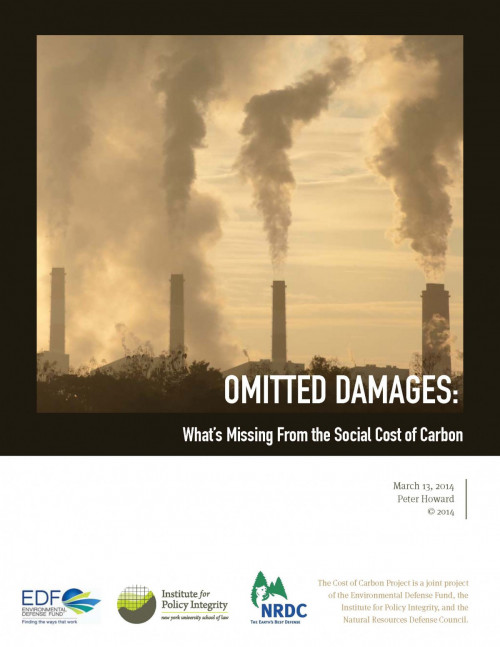-
Global Warming: Improve Economic Models of Climate Change
Costs of carbon emissions are being underestimated, but current estimates are still valuable for setting mitigation policy, say Richard L. Revesz, Peter H. Howard, Kenneth Arrow, Lawrence H. Goulder, Robert E. Kopp, Michael A. Livermore, Michael Oppenheimer, and Thomas Sterner in Nature.
-

Omitted Damages: What’s Missing from the Social Cost of Carbon
The social cost of carbon is an estimate of the economic damage done by each ton of carbon dioxide spewed into the air. Howard examines the Integrated Assessment Models used to produce the social cost of carbon estimate and gives a comprehensive review of what each model accounts for and what each model misses.
-
Comments Submitted to OMB in Support of the Social Cost of Carbon
Policy Integrity submitted comments to the Office of Management and Budget (OMB) voicing our support for the Administration’s continued use of the social cost of carbon (SCC) as it provides an important, if conservative, estimate of the costs of climate change and the benefits of reducing carbon pollution.
-
Policy Integrity Staff Attend Supreme Court Oral Arguments on EPA PSD Permitting Case
Policy Integrity director, Richard Revesz, legal director, Jason Schwartz, and legal fellow Denise Grab were at the Supreme Court today to hear oral arguments in the case challenging the Environmental Protection Agency’s (EPA) authority to regulate greenhouse gas emissions from stationary sources under the prevention of significant deterioration (PSD) program.
-
Supreme Court Amicus Brief on EPA’s PSD Permitting Case
Policy Integrity filed an amicus brief with the U.S. Supreme Court supporting the authority of the Environmental Protection Agency (EPA) to regulate greenhouse gas emissions from stationary sources under the prevention of significant deterioration (PSD) program.
-
Comments on EPA Proposed 2014 Standards for the Renewable Fuel Standard Program
Policy Integrity submitted comments to the Environmental Protection Agency (EPA) on the agency’s proposed 2014 standards for the Renewable Fuel Standard (RFS) program. EPA proposes to reduce renewable fuel targets from 2013 levels, due to concerns regarding industry’s ability to produce sufficient quantities of qualifying fuel and consumers’ ability to use the fuel. This backsliding highlights the RFS program’s inability to guarantee steady reductions in greenhouse gas emissions.
-
Comments on Con Edison Storm Hardening and Resilience Collaborative Report
On January 10, Policy Integrity, along with New York University’s Guarini Center, submitted comments on Con Edison’s Storm Hardening and Resilience Collaborative Report. The comments urge New York’s Public Service Commission (PSC) to extend the charter of the cost-benefit analysis working group convened as part of the collaborative process surrounding Con Edison’s latest ratemaking proceeding.
-
_110_86_90.jpg)
Quantifying Regulatory Benefits
The author responds to an argument made by Cass Sunstein that administrative agencies should use breakeven analysis when unable to quantify benefits of a specific regulation. Breakeven analysis seeks to determine how high nonquantifiable benefits of a regulation would have to be for the benefits to justify the costs. In this Comment, the author argues that breakeven analysis can be useful but is always a second-best technique. The first-best approach is to quantify the benefit.
-

Cost-Benefit Analysis and Agency Independence
In “Cost-Benefit Analysis and Agency Independence,” Professor Michael A. Livermore argues that cost-benefit analysis provides a standard that constrains the exercise of OIRA’s power, helping to preserve the autonomy of government agencies in the face of White House review. This argument challenges the prevailing view that cost-benefit analysis is a tool for the President to impose authority over executive agencies.
-
Burning Rain: The Long-Range Transboundary Air Pollution Project
Book Chapter
This chapter, in Toxic Airs: Body, Place, Planet in Historical Perspective, assesses the development of the first international study to examine the atmospheric transport of pollutants that cause acid precipitation: the long-range transboundary air pollution project.

